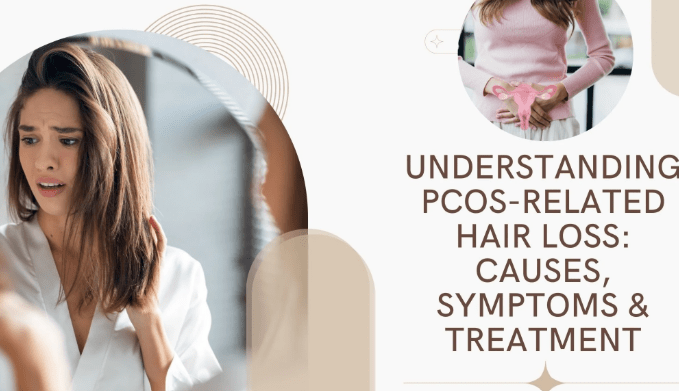Understanding Heavy Hairfall During PCOS: Causes, Effects, and Solutions
Polycystic Ovary Syndrome (PCOS) is a common hormonal disorder affecting millions of women worldwide. Alongside its hallmark symptoms—irregular periods, weight gain, and acne—heavy hairfall is one of the most distressing issues faced by women with PCOS. Hair is often seen as a symbol of beauty and health, and losing it can take a significant toll on one’s confidence and emotional well-being. This article explores the connection between PCOS and hairfall, its causes, and effective management strategies.
Why Does PCOS Cause Hairfall?
Hairfall in PCOS is primarily attributed to hormonal imbalances, particularly an increase in androgens (male hormones) such as testosterone. Here’s how these hormonal changes lead to hair loss:
- Androgenic Alopecia:
High levels of androgens shrink hair follicles, causing a condition called androgenic alopecia or female pattern baldness. Hair becomes thinner, especially around the crown and temples, and may fall out in clumps. - Insulin Resistance:
PCOS is often accompanied by insulin resistance, which can exacerbate hormonal imbalances. Elevated insulin levels stimulate the production of androgens, further contributing to hair thinning and loss. - Chronic Inflammation:
Many women with PCOS experience low-grade inflammation, which can weaken hair follicles and slow down hair growth. - Nutritional Deficiencies:
PCOS can lead to deficiencies in essential nutrients like vitamin D, iron, and zinc, all of which play a critical role in maintaining healthy hair.
Effects of Hairfall on Women with PCOS
Hairfall isn’t just a physical concern—it can deeply impact emotional and mental health. Women with PCOS often report feelings of low self-esteem, anxiety, and depression due to visible hair thinning. It’s crucial to acknowledge these emotional struggles and seek support when needed.
Managing Hairfall in PCOS
While hairfall caused by PCOS can be challenging, it is not irreversible. Here are some effective strategies to combat hairfall and promote regrowth:
1. Regulate Hormones
- Medical Intervention: Consult an endocrinologist or gynecologist for treatments that regulate hormones. Birth control pills, anti-androgen medications like spironolactone, or metformin may be prescribed to manage symptoms.
- Natural Hormone Regulation: Lifestyle changes such as stress management, regular exercise, and a balanced diet can help restore hormonal balance.
2. Opt for a Balanced Diet
- Focus on a diet rich in whole grains, lean proteins, fruits, and vegetables.
- Include foods high in zinc, iron, and biotin to nourish hair follicles.
- Reduce processed foods and sugar to stabilize insulin levels.
3. Hair Care Practices
- Use gentle, sulfate-free shampoos and conditioners designed for thinning hair.
- Avoid excessive heat styling, tight hairstyles, or harsh chemical treatments that can further weaken hair.
- Massage your scalp regularly with natural oils like coconut or castor oil to stimulate blood flow.
4. Consider Supplements
- Vitamin D: A deficiency in vitamin D is common in women with PCOS. Supplements can support overall health and hair regrowth.
- Iron and Zinc: These minerals are crucial for maintaining strong, healthy hair.
- Biotin: Often referred to as the “hair vitamin,” biotin supports keratin production, a key component of hair.
5. Seek Professional Treatments
- Minoxidil: This topical treatment is FDA-approved for hair regrowth in androgenic alopecia.
- PRP Therapy (Platelet-Rich Plasma): A dermatologist can use PRP therapy to stimulate hair regrowth.
- Laser Therapy: Low-level laser therapy devices are available for at-home use and can help boost hair density.
Emotional and Mental Well-being
Dealing with hairfall can be emotionally draining. Support groups, counseling, or talking with loved ones can provide relief. Remember, PCOS is a manageable condition, and taking proactive steps can lead to positive outcomes.
Conclusion
Hairfall due to PCOS can be challenging, but with the right combination of medical treatments, lifestyle changes, and self-care practices, it is possible to regain control over your hair health. If you’re experiencing significant hair loss, consult a healthcare provider to develop a personalized plan tailored to your needs. Remember, you are not alone, and support is available to help you navigate this journey with confidence.


